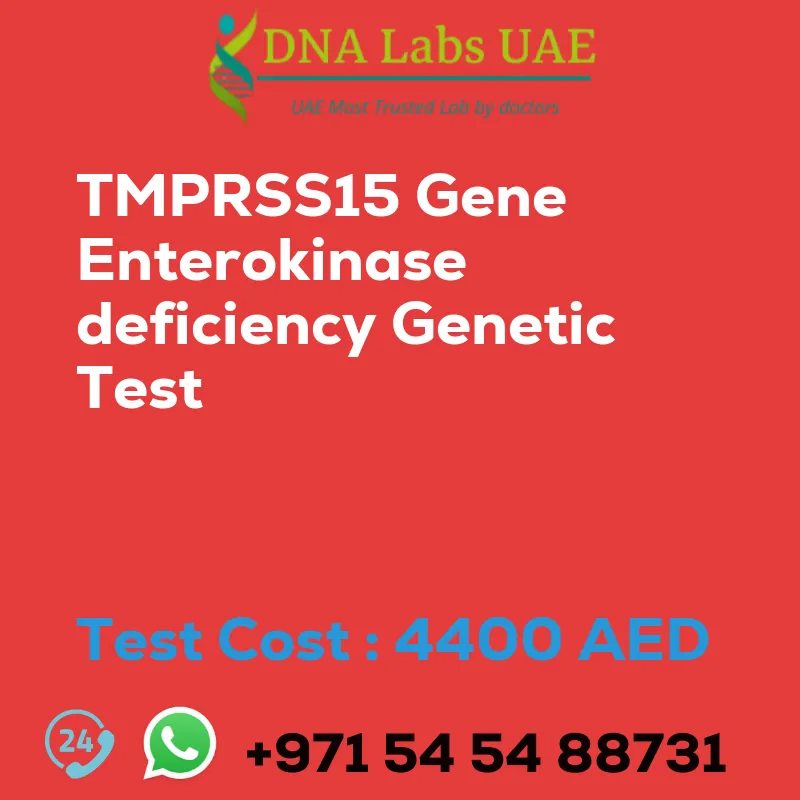TMPRSS15 Gene Enterokinase Deficiency Genetic Test
Test Details
TMPRSS15 gene enterokinase deficiency is a rare genetic disorder that affects the function of the TMPRSS15 gene. This gene provides instructions for making a protein called enterokinase, which plays a crucial role in the digestion and absorption of dietary proteins in the small intestine. Enterokinase deficiency can lead to impaired protein digestion and absorption, resulting in malnutrition, failure to thrive, and other gastrointestinal symptoms such as diarrhea. This condition is typically diagnosed in infancy or early childhood.
Test Name
TMPRSS15 Gene Enterokinase deficiency Genetic Test
Components
Price: 4400.0 AED
Sample Condition
Blood or Extracted DNA or One drop Blood on FTA Card
Report Delivery
3 to 4 Weeks
Method
NGS Technology
Test Type
Metabolic Disorders
Doctor
General Physician
Test Department
Genetics
Pre Test Information
Clinical History of Patient who is going for TMPRSS15 Gene Enterokinase deficiency NGS Genetic DNA Test. A Genetic Counselling session to draw a pedigree chart of family members affected with Enterokinase deficiency.
Test Details
TMPRSS15 gene enterokinase deficiency is a rare genetic disorder that affects the function of the TMPRSS15 gene. This gene provides instructions for making a protein called enterokinase, which plays a crucial role in the digestion and absorption of dietary proteins in the small intestine. Enterokinase deficiency can lead to impaired protein digestion and absorption, resulting in malnutrition, failure to thrive, and other gastrointestinal symptoms such as diarrhea. This condition is typically diagnosed in infancy or early childhood.
NGS (Next-Generation Sequencing) genetic testing is a type of genetic test that uses advanced sequencing technologies to analyze multiple genes simultaneously. In the case of TMPRSS15 gene enterokinase deficiency, NGS genetic testing can identify mutations or variations in the TMPRSS15 gene that may be responsible for the disorder. By identifying the specific genetic mutations associated with enterokinase deficiency, NGS genetic testing can help confirm a diagnosis, guide treatment decisions, and provide information about the likelihood of the condition being passed on to future generations. This information can be valuable for genetic counseling and family planning purposes.
| Test Name | TMPRSS15 Gene Enterokinase deficiency Genetic Test |
|---|---|
| Components | |
| Price | 4400.0 AED |
| Sample Condition | Blood or Extracted DNA or One drop Blood on FTA Card |
| Report Delivery | 3 to 4 Weeks |
| Method | NGS Technology |
| Test type | Metabolic Disorders |
| Doctor | General Physician |
| Test Department: | Genetics |
| Pre Test Information | Clinical History of Patient who is going for TMPRSS15 Gene Enterokinase deficiency NGS Genetic DNA Test A Genetic Counselling session to draw a pedigree chart of family members affected with Enterokinase deficiency |
| Test Details |
TMPRSS15 gene enterokinase deficiency is a rare genetic disorder that affects the function of the TMPRSS15 gene. This gene provides instructions for making a protein called enterokinase, which plays a crucial role in the digestion and absorption of dietary proteins in the small intestine. Enterokinase deficiency can lead to impaired protein digestion and absorption, resulting in malnutrition, failure to thrive, and other gastrointestinal symptoms such as diarrhea. This condition is typically diagnosed in infancy or early childhood. NGS (Next-Generation Sequencing) genetic testing is a type of genetic test that uses advanced sequencing technologies to analyze multiple genes simultaneously. In the case of TMPRSS15 gene enterokinase deficiency, NGS genetic testing can identify mutations or variations in the TMPRSS15 gene that may be responsible for the disorder. By identifying the specific genetic mutations associated with enterokinase deficiency, NGS genetic testing can help confirm a diagnosis, guide treatment decisions, and provide information about the likelihood of the condition being passed on to future generations. This information can be valuable for genetic counseling and family planning purposes. |








